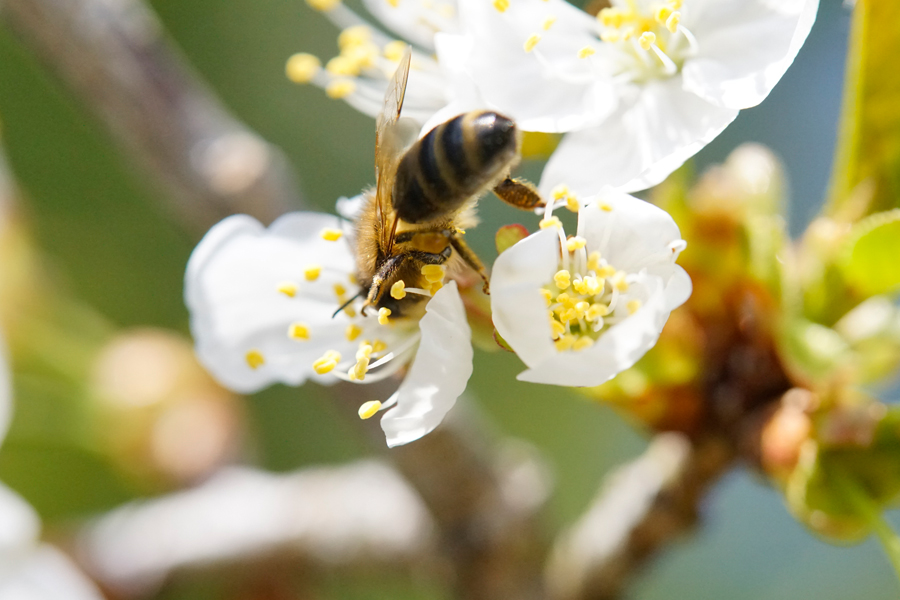Hallo
Rext
What is an orchard meadow?
In many regions of Germany, including our beautiful home on the Middle Rhine, orchard meadows are part of the typical landscape. The term defines the planting of high-stemmed trees, which are scattered mostly between or in meadows and pastures, fields or in small areas along the wayside. These can be fruit trees of different species and varieties, of different ages. Mostly, the orchard stands are old fruit varieties in the form of grafted high trunks that:
- have an intense aroma,
- are characterised by robustness and
- have low demands on care and location.
In contrast to today's common fruit cultivation with monocultures of low-trunk trees, an orchard meadow is a small biotope that provides a wonderful home for grasses, herbs, insects and small animals. Thus, the management and maintenance of orchard meadows is a valuable contribution to environmental protection and nature conservation.
Ecological value and benefits of orchard meadows

Orchard meadows are more important than ever in our time: large areas of arable land are often cultivated as monocultures in order to maximise profits for agricultural companies. In the process, environmental protection and nature conservation often fall by the wayside. In contrast, orchard cultivation is less profitable from an economic point of view, but orchard meadows make a major contribution to preserving the biodiversity of flora and fauna. Insects, arachnids, reptiles, amphibians, birds and small mammals find an optimal habitat here. Wild herbs and grasses also find their way around the fruit trees to form an individual biotope that is naturally adapted to the soil conditions and climate. Depending on the location, an orchard meadow can provide a home for several thousand animal and plant species.
Use of fruit from the orchard in our Rabenhorst juices
For our high-quality juice production, we prefer to use fruit from the region. We benefit from short transport routes and good cooperation with regional fruit suppliers, which we experience anew every day as a valuable commodity. At our apple collection points, where private individuals can deliver their apples, we like to maintain contact and exchange ideas on topics such as sustainable nutrition. Our payout price at the collection points is about 50 % higher than the average payout price of cideries in Germany.
Our commitment to the preservation of orchard meadows

Fair cooperation with our suppliers is very important to us. That is why we agree long-term purchase guarantees for our contract farmers and even offer private individuals the opportunity to hand over their apples to us for a reasonable payment. In addition, we encourage our partners' passion for the orchard meadows by donating trees and providing harvesting equipment. Through our commitment to the orchard meadows, we support their long-term preservation so that we can continue to produce delicious juices from natural ingredients in the future. In return, we give you our quality promise - yesterday, today and tomorrow.
FAQ
What grows in an orchard meadow?
In orchard meadows, mainly robust and undemanding standard fruit trees are planted. The classic fruit varieties include apple, pear, cherry and plum. In addition to the fruit trees, there are also numerous grasses, wild herbs and possibly berry bushes, which provide a valuable food source for insects. Orchard meadows can thus be home to several thousand animal and plant species that find a good habitat here.
Which Rabenhorst juices are made from wild apples?
Apples from orchard cultivation are used as raw material for various Rabenhorst juices. For our naturally cloudy apple juice "Streuobst-Apfel", for example, we exclusively use organic orchard apples. Other products in which fruit is used include 11 Plus 11 Red, 11 Plus 11 Fruit and Vegetables and For the Immune System.
How does Rabenhorst promote the conservation of orchard meadows?
For many years, orchard meadows were considered an unprofitable form of landscape. Many farmers and private individuals therefore sold their land or converted it. However, in order to preserve existing orchard meadows as biotopes in the long term or even to create new meadows, Rabenhorst works with regional orchard associations on a long-term basis. Fair conditions for the orchard fruit and a guaranteed purchase enable our contract farmers to manage their orchard meadows profitably and thus maintain them in the long term. Our experience in juice processing, our desire for high quality and our concern for sustainability thus combine to form an optimal partnership with our suppliers.

